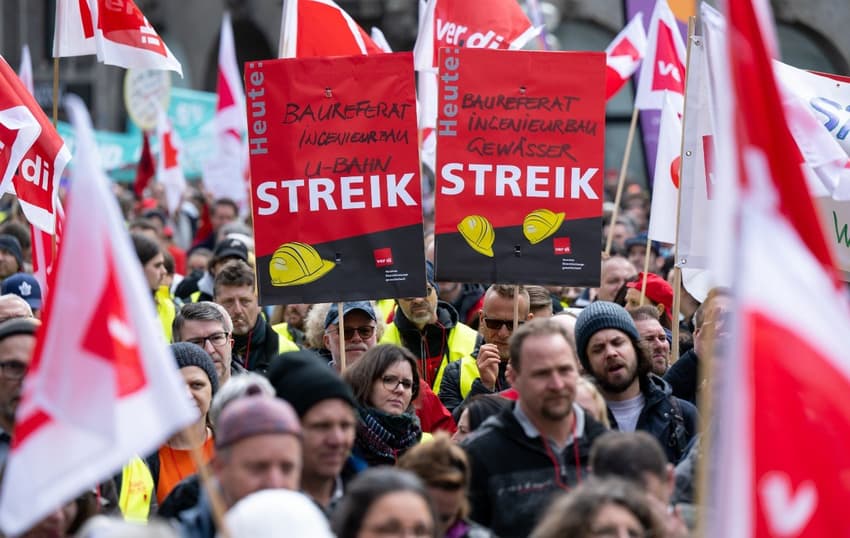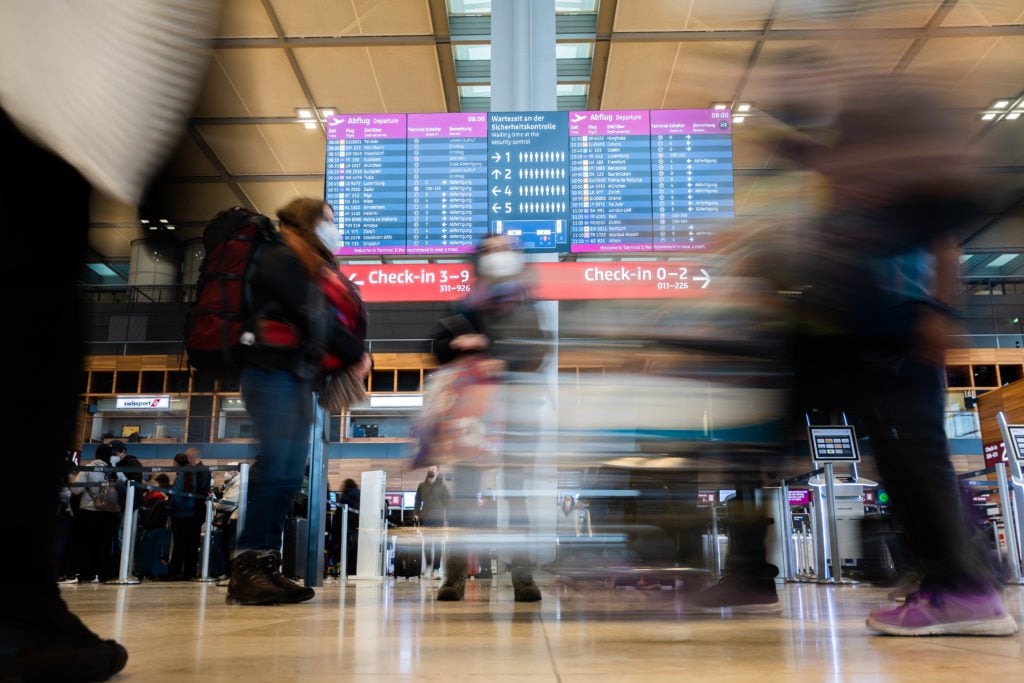EXPLAINED: What to expect during Monday's 'mega strike' in Germany

After a month of repeated public-sector strikes in Germany hitting everything from airports to public transport and childcare, the next round of collective bargaining kicks off Monday with the biggest walk-out yet. Here’s how your plans could be affected.
Two big German unions – Verdi and the Eisenbahn- und Verkehrsgewerkschaft (EVG) – are coordinating their strikes on Monday to get maximum possible leverage from public sector employers, as they seek a 10.5 percent wage increase to help their workers combat cost of living increases.
The day of action - which is being branded a 'Mega Strike' - looks set to be Germany’s largest in around 30 years.
The walk-out will see massive disruption on transport networks around the country, with chaos expected on local buses, trams and trains, on long-distance trains, and at airports.
The strike is set to last for 24 hours, starting at midnight as Sunday evening rolls into the early morning hours on Monday, lasting until Monday at 11:59 pm – with regular service resuming in the early hours of Tuesday morning.
READ ALSO: EXPLAINED: Why are there so many strikes in Germany right now?
Local, regional, and long-distance trains and public transport to be severely affected
Germany’s state-owned railway operator Deutsche Bahn is warning train travellers to expect that almost no train travel will be possible anywhere in the country on Monday.
DB has announced that it’s not operating any long-distance trains on Monday and that most regional trains will also be offline for the day.
Furthermore, because of how some of the relevant shifts are affected, DB says some trains might already be taken offline on Sunday evening, so travellers should take care to arrive at their destination on Sunday with plenty of time to spare – by late afternoon to be safe.
On top of that, some trains could be cancelled Tuesday due to knock-on effects.
According to the rail operator, any customers who have a ticket booked anytime between the 26th and 28th of March can rebook free of charge on a train running anytime up until April 4th.
You can also find updates on affected services on the Deutsche Bahn app or website.
DB is the largest, but not the only railway transport company affected, however.
Workers with Transdev, AKN, Osthannoversche Eisenbahnen, erixx, vlexx, eurobahn, and the Länderbahn are also affected.
That means that in addition to Deutsche Bahn, which runs services like the commuter S-Bahn and regional trains in German cities, local transport will be disrupted in seven of Germany’s sixteen federal states. These include some of the country’s most populous states: Bavaria, Baden-Württemberg, Hesse, Lower Saxony, North Rhine-Westphalia, Rhineland-Palatinate, and Saxony.

A Deutsche Bahn ICE train leaves the long-distance train station at Frankfurt Airport. Both Frankfurt Airport and long-distance trains in Germany are set to be shut Monday. Photo: picture alliance/dpa | Arne Dedert
The Rheinbahn network in and around Düsseldorf as well as Cologne’s KVB will be on strike, as will Northwestern Railways in Osnabrück, Bielefeld, and Paderborn – bringing most traffic in the Rhine-Ruhr region to a standstill.
The country’s three largest cities are still running local public transport Monday.
Munich says there will be at least some restrictions on buses, trams, and U-Bahn services, but that at least part of the network will be running.
Even though the S-Bahn and regional trains will be out of service Monday in both Hamburg and Berlin, buses, trams, and U-Bahn services will still be running. But people in the country’s two largest cities should still expect some travel headaches – as demand for those services is likely to be higher than normal with the S-Bahn and regional trains out of the mix for the day.
READ ALSO: EXPLAINED: How to get compensation for delayed or cancelled trains in Germany
Airport chaos looms nationwide
Aviation security workers at all German airports — with the exception of Berlin — are also taking part in Monday’s strike.
Frankfurt Airport – the country’s busiest – has cancelled all regular passenger flights for Monday and is telling passengers to contact their airline directly to make alternative arrangements and to not come to the airport that day. Stuttgart and Bremen airports have also cancelled all flights – both taking off and landing – with more airports likely to follow.
The situation in Munich is even worse, with the airport telling passengers it has cancelled all flights for both Sunday and Monday due to the strike.

Berlin Airport will be the only airport in the country unaffected by Monday's planned "Mega Strike," with flights cancelled almost everywhere else. Photo: picture alliance/dpa | Christoph Soeder
Düsseldorf Airport is warning passengers to expect serious disruptions, and to keep hand luggage to a minimum to help ease security delays in the unlikely event your flight is still running.
READ ALSO: What are your rights in Germany is a flight is delayed or cancelled?
Roads, harbours and other strikes
Because some workers at roadworks companies in Germany are also taking part in the strike, there were initially some fears that certain road or highway tunnels could close, since they couldn’t be monitored. Traffic authorities now say these rumours aren’t true, as they have emergency measures in place to keep that infrastructure running.
Employees at Hamburg Harbour are also slated to strike, leaving some parts of the docks inaccessible to large ships.
Depending on their union affiliation, some kitas and clinics in both Berlin and Brandenburg are likely to be affected by the strike, along with waste collection in Berlin. The capital’s recycling service is already beginning a general strike to start on Saturday.

A young boy plays with bricks in a nursery school in Potsdam. Some kitas, particularly in Brandenburg, could be closed during Monday's "Mega Strike." Photo: picture alliance/dpa | Bernd Settnik
READ ALSO: Strikes: Do parents in Germany receive a day off when kitas close?
When could this end?
The public sector unions have timed the “Mega Strike” to coincide with the first day of another round of collective bargaining with public sector employers, with negotiations set to last through Wednesday.
The unions recently reached a deal with Deutsche Post, which is why postal workers aren’t striking, but the other sectors remain without a deal.
If no deal is reached this time, Deutsche Bahn could see more warning strikes until its next round of bargaining on April 24th and 25th.
Comments
See Also
Two big German unions – Verdi and the Eisenbahn- und Verkehrsgewerkschaft (EVG) – are coordinating their strikes on Monday to get maximum possible leverage from public sector employers, as they seek a 10.5 percent wage increase to help their workers combat cost of living increases.
The day of action - which is being branded a 'Mega Strike' - looks set to be Germany’s largest in around 30 years.
The walk-out will see massive disruption on transport networks around the country, with chaos expected on local buses, trams and trains, on long-distance trains, and at airports.
The strike is set to last for 24 hours, starting at midnight as Sunday evening rolls into the early morning hours on Monday, lasting until Monday at 11:59 pm – with regular service resuming in the early hours of Tuesday morning.
READ ALSO: EXPLAINED: Why are there so many strikes in Germany right now?
Local, regional, and long-distance trains and public transport to be severely affected
Germany’s state-owned railway operator Deutsche Bahn is warning train travellers to expect that almost no train travel will be possible anywhere in the country on Monday.
DB has announced that it’s not operating any long-distance trains on Monday and that most regional trains will also be offline for the day.
Furthermore, because of how some of the relevant shifts are affected, DB says some trains might already be taken offline on Sunday evening, so travellers should take care to arrive at their destination on Sunday with plenty of time to spare – by late afternoon to be safe.
On top of that, some trains could be cancelled Tuesday due to knock-on effects.
According to the rail operator, any customers who have a ticket booked anytime between the 26th and 28th of March can rebook free of charge on a train running anytime up until April 4th.
You can also find updates on affected services on the Deutsche Bahn app or website.
DB is the largest, but not the only railway transport company affected, however.
Workers with Transdev, AKN, Osthannoversche Eisenbahnen, erixx, vlexx, eurobahn, and the Länderbahn are also affected.
That means that in addition to Deutsche Bahn, which runs services like the commuter S-Bahn and regional trains in German cities, local transport will be disrupted in seven of Germany’s sixteen federal states. These include some of the country’s most populous states: Bavaria, Baden-Württemberg, Hesse, Lower Saxony, North Rhine-Westphalia, Rhineland-Palatinate, and Saxony.

The Rheinbahn network in and around Düsseldorf as well as Cologne’s KVB will be on strike, as will Northwestern Railways in Osnabrück, Bielefeld, and Paderborn – bringing most traffic in the Rhine-Ruhr region to a standstill.
The country’s three largest cities are still running local public transport Monday.
Munich says there will be at least some restrictions on buses, trams, and U-Bahn services, but that at least part of the network will be running.
Even though the S-Bahn and regional trains will be out of service Monday in both Hamburg and Berlin, buses, trams, and U-Bahn services will still be running. But people in the country’s two largest cities should still expect some travel headaches – as demand for those services is likely to be higher than normal with the S-Bahn and regional trains out of the mix for the day.
READ ALSO: EXPLAINED: How to get compensation for delayed or cancelled trains in Germany
Airport chaos looms nationwide
Aviation security workers at all German airports — with the exception of Berlin — are also taking part in Monday’s strike.
Frankfurt Airport – the country’s busiest – has cancelled all regular passenger flights for Monday and is telling passengers to contact their airline directly to make alternative arrangements and to not come to the airport that day. Stuttgart and Bremen airports have also cancelled all flights – both taking off and landing – with more airports likely to follow.
The situation in Munich is even worse, with the airport telling passengers it has cancelled all flights for both Sunday and Monday due to the strike.

Düsseldorf Airport is warning passengers to expect serious disruptions, and to keep hand luggage to a minimum to help ease security delays in the unlikely event your flight is still running.
READ ALSO: What are your rights in Germany is a flight is delayed or cancelled?
Roads, harbours and other strikes
Because some workers at roadworks companies in Germany are also taking part in the strike, there were initially some fears that certain road or highway tunnels could close, since they couldn’t be monitored. Traffic authorities now say these rumours aren’t true, as they have emergency measures in place to keep that infrastructure running.
Employees at Hamburg Harbour are also slated to strike, leaving some parts of the docks inaccessible to large ships.
Depending on their union affiliation, some kitas and clinics in both Berlin and Brandenburg are likely to be affected by the strike, along with waste collection in Berlin. The capital’s recycling service is already beginning a general strike to start on Saturday.

READ ALSO: Strikes: Do parents in Germany receive a day off when kitas close?
When could this end?
The public sector unions have timed the “Mega Strike” to coincide with the first day of another round of collective bargaining with public sector employers, with negotiations set to last through Wednesday.
The unions recently reached a deal with Deutsche Post, which is why postal workers aren’t striking, but the other sectors remain without a deal.
If no deal is reached this time, Deutsche Bahn could see more warning strikes until its next round of bargaining on April 24th and 25th.
Join the conversation in our comments section below. Share your own views and experience and if you have a question or suggestion for our journalists then email us at [email protected].
Please keep comments civil, constructive and on topic – and make sure to read our terms of use before getting involved.
Please log in here to leave a comment.